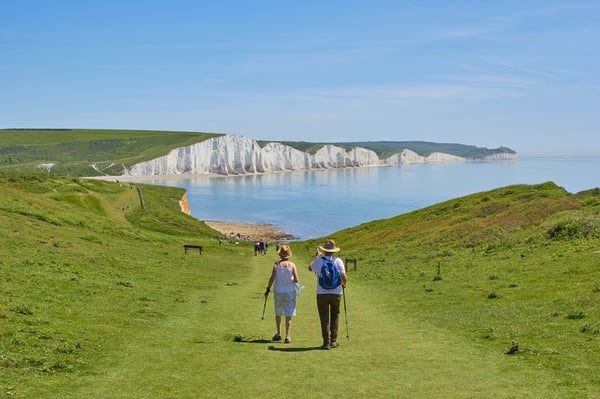After a year of Covid-related travel restrictions, retiring to a place in the sun might sound appealing to Brits who have spent most of 2020 and 2021 unable to leave the country. And beyond the weather, there are a number of other great reasons to consider retirement abroad - lower living costs; an enhanced quality of life; and a lifestyle that's better suited to your tastes, whatever they might be. Ancient history aficionados can make their home in Greece, avid golfers might opt for New Zealand, art lovers can head for the cathedrals and museums of Italy. Hundreds of thousands of British pensioners are currently enjoying their retirement abroad, for these reasons and more.
In fact, it's not easy to put a precise figure on the number of British pensioners living outside the UK, but we can see that Brexit and Covid-19 have put a dampener on many pensioners' dreams to retire abroad. It's difficult to say exactly how many, because we're largely reliant on census and registration data from the host country, which rarely includes temporary residents. But it looks as if the number of British retirees living in EU countries peaked in 2017 at 475,000 and, as of January 2021, had dropped to 463,774.
This article examines the advantages of retiring abroad and what to consider, if you're planning a big move.
Receiving your pension abroad? Avoid hidden currency exchange fees when transferring a pension overseas.
Why retire abroad?
There are so many benefits to living abroad. In many cases, you can drastically reduce your cost of living, while vastly enhancing your quality of life. Many British retirees head for locations with lower living costs, where accommodation is more affordable, and food is less expensive. Reducing your outgoings leaves more room for luxuries that you might not be able to afford back in Blighty. For example, more meals and drinks out, or a bigger home with a pool and garden. Lower labour costs in your new home country might mean you can even afford a gardener, cleaner, or a cook.
Where to retire abroad?
In 2017, 33% of all British emigrants (across all age groups) lived in Australia or New Zealand. 28% lived in the US or Canada, and 26% in the EU. The EU countries with the largest number of British pensioners were Spain and France. It's clear that a large number of British expats are looking to escape the weather back home, seeking sunnier climes in Australia, New Zealand, the US, and southern Europe.
But it's not all sandy beaches and sangria. If you want to avoid costly relocation pitfalls, you should take time to consider what it really means to retire abroad - beyond the elements you might experience while on holiday.
What to consider when planning your retirement abroad?
We've pulled together an overview of practical considerations to bear in mind when choosing your retirement destination.
1. Living costs and general expenses
These fall into the following categories:
- Accommodation - will you rent or buy?
- Food - consider the cost of grocery shopping as well as meals out.
- Travel - both to and from the country (if you're planning to visit home often) and travel within the country. Think about the viability of public transport, and how easy it will be to navigate for you. Alternatively, perhaps you'll need to buy or hire a car, or acquire an international driver's licence.
- Transport of goods from the UK, if you want to bring your own belongings.
- Expenses related to visas, residence permits, or other legal costs.
- Healthcare (see below).
2. Healthcare
This should be a key factor for all retirees planning to move abroad, as it will likely work very differently to the free NHS you're used to in the UK. And unfortunately, we tend to experience more health problems as we age.
Healthcare in the EU, post-Brexit
Post-Brexit, you can no longer rely on all healthcare costs being covered automatically for Brits residing in the EU. And it's unlikely that the UK will cover costs for your healthcare while abroad, so future visa applications will probably require proof of private medical insurance. However, the rules vary depending on the country itself, and also when you settled there.
Let's take the example of a British pensioner living in France. If she moved there before 1t January 2021, she won't see any changes to her healthcare. As a French resident enrolled in the social system and in receipt of the same rights as other French citizens, she will continue to receive healthcare cover. If she's only recently moved to France, she will need to request a UK-issued S1 form and register it with the French authorities, in order to receive healthcare cover. However, in the future, British expats will most likely be required to show proof of private medical insurance in order to reside in France.
Elsewhere in the world
Outside of the EU, the healthcare situation for expats varies drastically. In the US and South Africa, for example, you must acquire private medical insurance, and keep in mind that elderly pensioners with pre-existing conditions may struggle to get affordable insurance. Canada, Australia and New Zealand are perhaps closest to the UK, providing free care for all like the NHS. As in the UK, private medical insurance may increase choice and reduce waiting times, but it's definitely not a "must-haveâ€.
3. Exchanging currency
The currency market is live, so movements in the performance of the pound could work in your favour, but they could also cost you a pretty penny. YouGov carried out research on behalf of CurrencyFair in 2019, and found that competitive exchange rates were important to 26% of expats surveyed. In order to protect as much of your nest egg as possible, you should plan your currency exchanges carefully to minimise bank transfer costs and exposure to fluctuations in the market. Especially if you're making large purchases, such as a house or a car.
And it's not only a question of favourable exchange rates, you should also think about transfer fees. Banks typically charge eight times more for every money transfer than CurrencyFair, which can add up to considerable amounts over time. By using CurrencyFair, you know that you're getting the best rate available at that time, and paying reduced fees in comparison with the banks. CurrencyFair is also authorised under the Temporary Permissions Regime (TPR) from the Financial Conduct Authority (FCA) in the UK, so will continue to offer you the best rates in post-Brexit.
4. Visa requirements and residency
It goes without saying that the ability to settle in a country outside the UK will be a key factor for Brits, especially after Brexit. The UK's Withdrawal Agreement from the EU formalised the end of free movement of people (as well as goods and services) between the UK and EU countries, and so Brits looking to retire there can no longer secure residency so easily. If you were legally resident in the EU prior to 1 January 2021, your rights are protected under the Withdrawal Agreement and you simply need to apply for new residence status in order to stay. If you moved to the EU more recently, then you can only live in the country for up to 90 days in any 180-day period without a visa. In order to stay longer, you must meet the entry requirements set out by the country, which could mean applying for a visa. So it's not necessarily impossible to retire abroad in the EU, but you might need proof of income or savings, and possibly also private medical insurance.
Brits planning to retire outside the EU will face different challenges. Australia, for example, is an expensive option in visa terms. Some pensioners opt for the Investor Retirement Visa - a temporary four-year visa that's renewable for further periods of four years. It's designed specifically for those aged 55 or over, with no dependents. To be accepted, you need to prove a certain level of income, and you'll also need to invest a minimum of £450,000.
Whereas in the USA, securing residency is less costly. Retirees can obtain a B2 Visa, usually valid for 10 years. However, you can't stay in the States more than six months in one given year on this visa, and you're not eligible for a social security number. Without the latter, it will be complicated to open a bank account, obtain health insurance, and convert your driving licence. The good news is you won't be liable to pay US taxes, because you're not technically a resident there.
Pension and taxes
Further to our point above, your residency status will have an impact on whether or not you need to pay taxes in your host country, or back in the UK. Keep in mind that you might have to pay UK tax on any private pension you have, because it's likely to be considered as UK income. On top of this, you might also be taxed in the country you live in, unless it has a double taxation agreement with the UK which avoids you being taxed twice.
For many retirees, your plans for la belle vie abroad will depend on you being able to claim your UK state pension, and transferring it to local currency. Check out our article on getting your UK state pension while living in the EU.
As always, it's best to check your tax requirements and pension entitlements directly with HMRC and your private pension provider.
Language
The data tells us that most Brits favour relocating to English-speaking countries, such as Australia, New Zealand, the US and Canada.
If you're considering a move to a country where English is not spoken, then it's a good idea to have at least some basic knowledge of the local language, so that you can carry out everyday tasks such as opening a bank account, buying food, ordering in a restaurant, and getting to know your neighbours. Being able to converse with the locals will enable you to get more out of your expat life. It will also reduce any sense of isolation, and help you make connections with the people living nearby.
An expat life less ordinary
You should consider what you really want from your retirement, and the smartest way to get it post-Brexit. Moving to a less popular retirement destination might be a good option for you - check out our list of four alternative retirement hotspots.
Receiving your pension abroad? Avoid hidden currency exchange fees when transferring a pension overseas. 
"Disclaimer: This article is for general information purposes only and does not take into account your personal circumstances. This is not investment advice or an inducement to trade. The information shared is for illustrative purposes only and may not reflect current prices or offers from CurrencyFair. Clients are solely responsible for determining whether trading or a particular transaction is suitable. We recommend you seek independent financial advice and ensure you fully understand the risks involved before trading. Leveraged trading is high risk and not suitable for all. Losses can exceed investments. Opinions are the authors; not necessarily that of CurrencyFair or any of its affiliates, subsidiaries, officers or directors."
Photo by Christian Bowen on Unsplash
Sources:
https://www.investopedia.com/retirement/best-countries-to-retire/
https://www.movehub.com/blog/top-10-countries-brits-choose/
https://expatra.com/articles/retire/best-place-retire-abroad/
https://expatra.com/articles/retire/cheapest-countries-to-retire/











